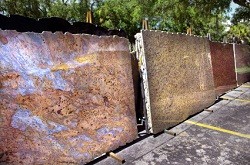Counter Intuitive: Which Countertop Material is Right for Your Home?

Whether you’re building a new custom home or remodeling your current home, there’s no debating that one of the most critical rooms in the house is the kitchen. And your countertops are one of the most critical components in your kitchen.
The good news is that there are now more options than ever when it comes to choosing your countertop materials. Of course, that’s the bad news as well. How do you make the right choice? It’s not always intuitive. Here’s a brief overview of some of the more popular treatments with quick pros and cons for each.
Laminate countertops are made of layers of paper treated with resin and pressed together under high heat and pressure over a base of composite chip wood. Formica is probably the best-known name among laminate manufacturers.
Pro: Laminate counters are the least expensive option and are fast and easy to install.
Con: Laminate counters scratch and chip easily, and they simply don’t have the elegance that other materials have.
Ceramic Tile countertops use (big surprise!) ceramic tiles as the main surface. This presents homeowners with as many color and pattern options as there are style of ceramic tile.
Pro: Variety and cost are the big pluses. Ceramic tiles can cost as little as (or less than) laminate.
Con: You have to continually clean the grout and treat the tile to make sure it’s moisture resistant. And tiles can crack.
Solid Surface countertops are man-made materials all the way through—there are no layers. The most well-know brand is probably Corian. They are a mid-range option in both price and aesthetic value.
Pro: If you damage the surface you can sand it out with very fine sandpaper.
Con: Solid surfaces can crack or scorch if you place something like a hot pan on them.
Natural or Engineered Stone counters include choices such as marble, granite, and slate for natural stone options. Engineered stone counters are a composite of quartz, pebbles, polymers, and epoxy.
Pro: Both options are sleek and attractive—lending a very high-end look to your kitchen.
Con: Aside from increased cost, stone is porous and requires sealing. It can crack (although this is unlikely). Engineered stone resists heat and stains better than natural stone.
Stainless Steel counters no longer belong exclusively to the domain of professional kitchens—although most homes use slightly thinner steel than found in professional kitchens.
Pro: Stainless is a unique and very sleek look for your kitchen.
Con: Aside from the expense ($100-$200/square foot) it’s not as “stainless” and robust as you might think.
Concrete countertops are the most recent trend. These custom surfaces can be tinted to virtually any color and can also be textured to your wishes. You’ll end up with a surface that’s as heavy and solid as granite.
Pro: Concrete counters are completely customizable in color and texture giving you a unique element around which to design your kitchen.
Con: Concrete needs to be sealed on a regular basis, and it’s not cheap (around $100/square foot).
As with most building and remodeling decisions, it comes down to what’s important to you—look, functionality, uniqueness, and cost. Hope this quick overview helps you consider your options!








_600x221.png?width=62&name=QCC_LOGO_(2)_600x221.png)

